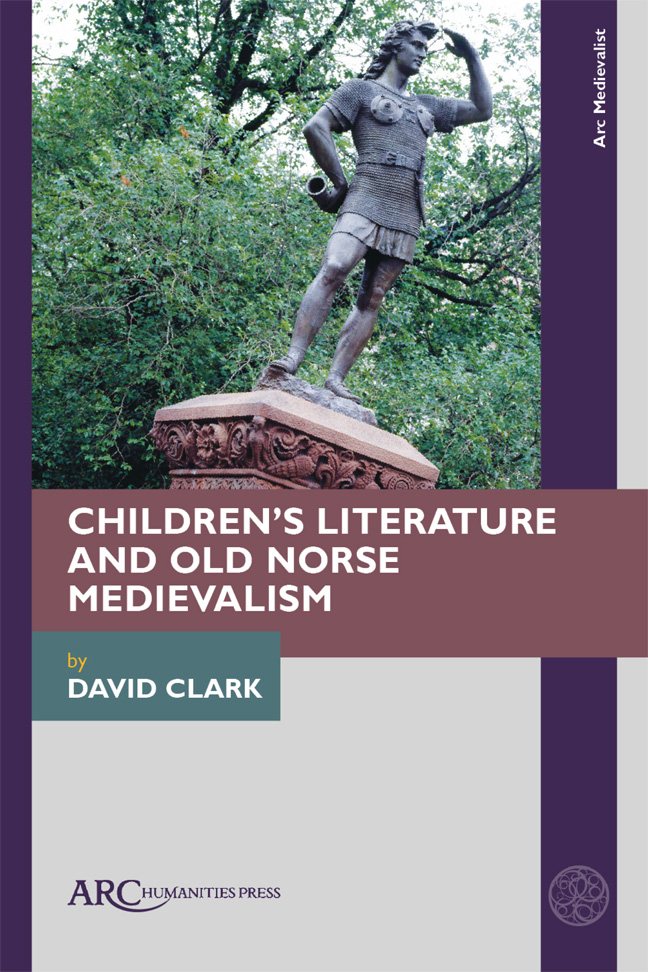Book contents
- Frontmatter
- Contents
- Acknowledgements
- Dedication
- Introduction: The End
- 1 Age-Related Categories
- 2 Generic Categories
- 3 Transformational Fantasy
- 4 Horned Helmets and Comic Anachronism
- 5 Viking Reputation
- 6 Runes and Magic
- 7 The Power of Story
- 8 Race and Ethnicity
- 9 Heroism
- 10 Viking Masculinity
- 11 Viking Femininity
- 12 Viking Sex and Gender
- 13 Bowdlerization
- 14 Sexuality
- 15 Ecological Threat
- 16 Norse Medievalism in Alan Early's Father of Lies Trilogy
- 17 Avoiding the End of Days: K. L. Armstrong and M. A. Marr's Blackwell Pages
- 18 Rick Riordan's Magnus Chase Series and Norse Medievalism
- Conclusion
- Select Bibliography of Frequently Cited Works
- Index
3 - Transformational Fantasy
Published online by Cambridge University Press: 17 February 2024
- Frontmatter
- Contents
- Acknowledgements
- Dedication
- Introduction: The End
- 1 Age-Related Categories
- 2 Generic Categories
- 3 Transformational Fantasy
- 4 Horned Helmets and Comic Anachronism
- 5 Viking Reputation
- 6 Runes and Magic
- 7 The Power of Story
- 8 Race and Ethnicity
- 9 Heroism
- 10 Viking Masculinity
- 11 Viking Femininity
- 12 Viking Sex and Gender
- 13 Bowdlerization
- 14 Sexuality
- 15 Ecological Threat
- 16 Norse Medievalism in Alan Early's Father of Lies Trilogy
- 17 Avoiding the End of Days: K. L. Armstrong and M. A. Marr's Blackwell Pages
- 18 Rick Riordan's Magnus Chase Series and Norse Medievalism
- Conclusion
- Select Bibliography of Frequently Cited Works
- Index
Summary
IN TRANSFORMATIONAL FANTASIES, by far the most populous genre for Norse medievalism, authors tend to take one of two approaches. They may create a more-or-less accurately researched version of the medieval past in which fantasy elements such as dragons or magic are central to the everyday reality of the world (and which might therefore also be classed as magic(al) realist works, or fantasy historical). Alternatively they may transform medieval material in creating their own imagined worlds and immersive fantasies. Of course, the transformational fantasy's most enduring influence stems from Tolkien, though he himself was influenced by earlier and contemporary fantasists such as William Morris and E. R. Eddison. The former wrote The Wood Beyond the World (1894) and The Well Between the Worlds (1896), as well as extensive (archaizing) medievalist poems and saga translations, and the latter penned the belligerent fantasy The Worm Ouroboros (1922) as well as translating Egil's Saga (1930).
Transformational fantasy novels may involve a shift in setting comparable to timeslip novels, but here the slippage here is from one reality to another—often described as a move from a primary to a secondary world—and may be accomplished by mechanical means such as gates or portals (like the wardrobe in the Narnia Chronicles). Many fantasy novels, however, immerse the reader in the imagined setting. Some authors weave both Old English and Old Norse myths or culture together in creating their own imagined worlds. For instance, A. J. Lake's Darkest Age series combines historical detail from Pre-Conquest England and Viking culture with dragons and magic. Similarly, Nancy Farmer's The Sea of Trolls (2004) incorporates Saxons, Northmen, magical animals, trolls, the Norns, and Grendel.
Boneless Mercies
April Genevieve Tucholke's The Boneless Mercies (2018) blurs the line between history and fantasy. Just as the setting of Marcus Sedgwick's The Dark Horse cannot be precisely pinpointed, though the novel employs the conventions of historical fiction, Tucholke's narrative takes place in a world influenced by Norse culture but presents an “alternative history” and draws heavily on the conventions of fantasy.
Frey and her companions are the “Boneless Mercies” of the title, witches hired to bring death in Vorseland, a world in which heroic deeds are sung about by bards in sagas like “Ergill's Saga” (42) and tales tell of Jotuns (140) and of how “rainbows bridge the world of Vorse to the realm of the gods” (85).
- Type
- Chapter
- Information
- Children's Literature and Old Norse Medievalism , pp. 39 - 46Publisher: Amsterdam University PressPrint publication year: 2023

